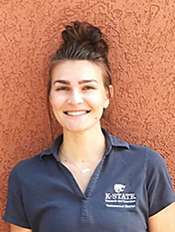
Though we often think of soil testing as a spring chore, fall can be a better time.
Soil-testing laboratories are often very busy during the spring resulting in a longer turnaround from submission to recommendations. Also, soils in the spring are often waterlogged, making taking samples difficult.
If your soil test suggests more organic matter, fall is a much better season because materials are more available than in the spring (tree leaves), and fresher materials can be used without harming young tender spring-planted plants.
Begin by taking a representative sample from at least six locations in the garden or lawn. Each sample should contain soil from the surface to about 6 to 8 inches deep.
This is most easily done with a soil sampler. Many K-State Research and Extension offices have such samplers available for checkout. If you don’t have a sampler, use a shovel to dig straight down into the soil. Then shave a small layer off the back of the hole for your sample. Mix the samples together in a clean plastic container and select about 1 to 1.5 cups of soil. This can be placed in a plastic container such as a resealable plastic bag.
Take the soil to your county extension office to have tests done for a small charge at the K-State soil-testing laboratory. A soil test determines fertility problems, not other conditions that may exist such as poor drainage, poor soil structure, soil-borne diseases or insects, chemical contaminants or damage, or shade with root competition from other plants. All these conditions may reduce plant performance but cannot be evaluated by a soil test.
Lauren Walz is the Horticulture Extension Agent for the Cottonwood Extension District. If you have questions, she can be contacted by e-mail at [email protected] or by phone at 785-628-9430 or 620-793-1910.






